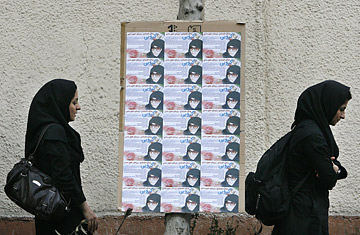
A poster displays reformist candidate Fatemeh Karroubi, who is running in Iran's parliamentary elections.
President Bush may have urged Iranians to boycott Fridays parliamentary election, but even the reformist factions who saw some 700 of their candidates disqualified by the Guardian Council are urging their supporters to vote. (They're still competing for around 100 of the 290 seats in the majlis, or legislature.) Many of those disqualified had once been considered khodi, or insiders, and include former ministers, governors and MPs, and heroes of the fight against the Shah or the Iran-Iraq war. Those barred from running even included two grandsons of the Islamic Republic's iconic founder, Ayatollah Ruhollah Khomeini.
"Anyone with any connection to the reformists was ... disqualified," says Mostafa Tajzadeh, one of the directors of the United Reformists Coalition (URC) election campaign. "We had a lot of long discussions about this, and, in the end, decided not to boycott the elections." Tajzadeh, who was himself disqualified, explains the reformists' motivation: "If we don't participate, the entire majlis will fall into the hands of the conservatives and the situation will be one of homogeneous despotism. We can't let that happen."
Similarly, the symbolic figurehead of the reformist movement, former President Mohammad Khatami, called on Iranians to "Participate, though submissively, but with joy!" The reformists' expressed rationale is that the only other options are either another revolution, or a foreign invasion — and, like most other Iranians inside Iran, they reject both out of hand. "You see we have no choice. We're choosing the best way forward from a number of bad options," says Tajzadeh.
One reformist, Khatamis younger brother and a former MP, Mohammad Reza Khatami, even went so far as to tell a newspaper, "We participate in order to save the country." Reformist strategists believe that if all political branches fall into nearly unanimous conservative hands, the split between society and government will become so pronounced as to risk "an undesired social explosion," says Tajzadeh.
So the reformists have been busy trying to garner support. Their political leaders have been giving talks in universities and other centers, in support of a common mantra: "If people don't vote, the situation will get even worse," in the words of Mehdi Karroubi, former majles speaker and current head of the center-left National Trust party.
Iran's main student opposition group, the former Office to Foster Unity, whose name now translates into Islamic Irans Organization of the Educated Ones," had declared that neither participation nor a boycott would make any difference, contending, "The elections have been engineered in a way that it doesn't matter how many people participate. Either way, more conservative members will enter parliament."
While the reformists see this majlis election as a matter of life and death for their own political movement, others see it as a test of popularity for Ahmadinejad and the conservatives. Which is why the president has been making visits to the provinces and smaller towns seeking votes for conservatives.
Eslamshahr, one such town of about 300,000 people an hour outside of Tehran, is typical of the places to which Ahmadinejad looks as the bedrock of his support. It's a dusty place with only basic infrastructure, greeting visitors with "Welcome to the martyr-nurturing town of Eslamshahr."
Asked if he will vote, one shop owner here says, "Vote for whom? All they do is talk! Ahmadinejad is a good man; at least he's not corrupt, but all he can do is talk! Where's the action? It's all slogans." A few stores down, a car mechanic says, "I'm not sure I'll vote, but I'll tell you that a lot of others here will. Do you know how many martyrs this town has given to the Iran-Iraq war? People are invested here. And then you have the candidates coming here and advertising and giving lunches and dinners, it doesn't take much to get people's votes."
In the town center, a young couple with a baby say their biggest financial burden is their rent. Ahmadinejad's government started a scheme to lease land to poor families for 99 years and to allow them to build houses with government financial support. The couple signed up for the scheme and have already paid the equivalent of $60 to the government. "If it comes true, we'll definitely vote for Ahmadinejad in the next round, but we're not sure about majlis yet," says the 29-year old mother, Mrs. Pahlavani.
Back in Tehran, the reformists' campaign slogans revolve around pain and perseverance, while the conservatives paint bright horizons. Passing a reformists' election poster in Tehran's 7th Tir Square, Mehrdad Ghaffari, 21, an electrical engineering student is asked whether he'll vote. "These elections have nothing to do with us," he says. "Most of the representatives are already chosen anyway."
"Our problem is that hopelessness has overtaken society," says Maziar Aghazadeh, a spectacled activist in the reformist Iran Youth Party, now in charge of campaign advertising for the United Reformists Coalition. "Our responsibility is to get the youth of this country interested in politics again," he adds between phone calls. "Our election slogan is 'Join our path, dear, because this common pain won't be healed separately.' And what we tell young people is that we have no choice but to participate. If we don't despair, eventually, not in these majles elections, but eventually, we will win, because our numbers are so much greater than theirs."
